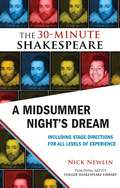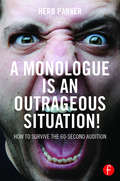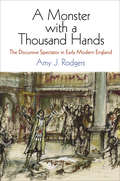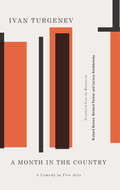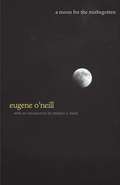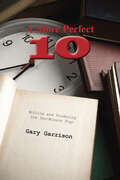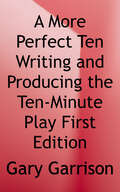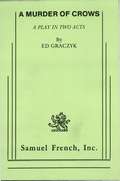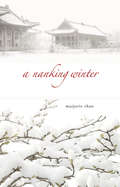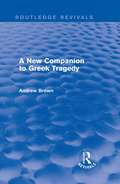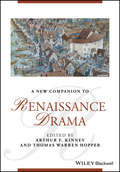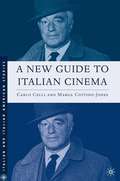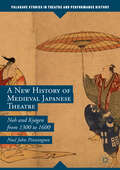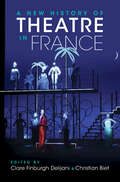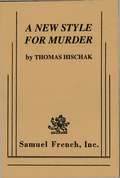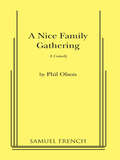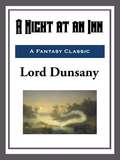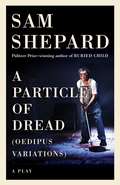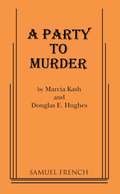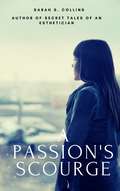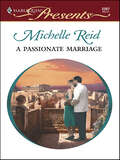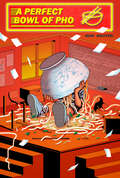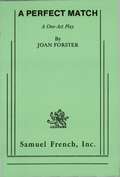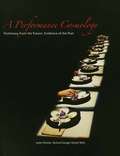- Table View
- List View
A Midsummer Night's Dream: The 30-Minute Shakespeare
by Nick NewlinPlanning a school or amateur Shakespeare production? The best way to experience the plays is to perform them, but getting started can be a challenge: The complete plays are too long and complex, while scene selections or simplified language are too limited."The 30-Minute Shakespeare" is a new series of abridgements that tell the "story" of each play from start to finish while keeping the beauty of Shakespeare's language intact. Specific stage directions and character suggestions give even inexperienced actors the tools to perform Shakespeare with confidence, understanding, and fun!This cutting focuses on three ridiculously funny and vibrant scenes from A MIDSUMMER NIGHT'S DREAM. The first scene starts with Puck mistakenly anointing the eyes of the wrong lovers with love potion, leading to a madcap chase scene between Helena, Lysander, Hermia, and Demetrius. Scene two features Bottom's magical transformation to an ass, always an audience favorite. The final scene is the classic play within a play, where the "Rude Mechanicals" act out with "tragical mirth" the story of Pyramus and Thisbe, with specific comic suggestions for the characters, including Lion chasing Thisbe into the audience!The edition also includes an essay by editor Nick Newlin on how to produce a Shakespeare play with novice actors, and notes about the original production of this abridgement at the Folger Shakespeare Library's annual Student Shakespeare Festival.
A Monologue is an Outrageous Situation!: How to Survive the 60-Second Audition
by Herb ParkerA Monologue is an Outrageous Situation! How to Survive the 60-Second Audition explains how to successfully tackle the "cattle call" acting audition with a sixty-second monologue. Through Q&As, tips, director’s notes, and a glossary full of outrageous actions meant to inspire the actor into truly connecting with the piece, this book shows actors where and how to find a monologue, edit it, and give the best audition possible.
A Monster with a Thousand Hands: The Discursive Spectator in Early Modern England
by Amy J. RodgersA Monster with a Thousand Hands makes visible a figure that has been largely overlooked in early modern scholarship on theater and audiences: the discursive spectator, an entity distinct from the actual bodies attending early modern English playhouses. Amy J. Rodgers demonstrates how the English commercial theater's rapid development and prosperity altered the lexicon for describing theatergoers and the processes of engagement that the theater was believed to cultivate. In turn, these changes influenced and produced a cultural projection—the spectator—a figure generated by social practices rather than a faithful recording of those who attended the theater. The early modern discursive spectator did not merely develop alongside the phenomenological one, but played as significant a role in shaping early modern viewers and viewing practices as did changes to staging technologies, exhibition practices, and generic experimentation.While audience and film studies have theorized the spectator, these fields tend to focus on the role of twentieth-century media (film, television, and the computer) in producing mass-culture viewers. Such emphases lead to a misapprehension that the discursive spectator is modernity's creature. Fearing anachronism, early modern scholars have preferred demographic studies of audiences to theoretical engagements with the "effects" of spectatorship. While demographic work provides an invaluable snapshot, it cannot account for the ways that the spectator is as much an idea as a material presence. And, while a few studies pursue the dynamics that existed among author, text, and audience using critical tools sharpened by film studies, they tend to obscure how early modern culture understood the spectator. Rather than relying exclusively on historical or theoretical methodologies, A Monster with a Thousand Hands reframes spectatorship as a subject of inquiry shaped both by changes in entertainment technologies and the interaction of groups and individuals with different forms of cultural production.
A Month in the Country
by Larissa Volokhonsky Richard Pevear Ivan Turgenev Richard Nelson"Pevear and Volokhonsky are at once scrupulous translators and vivid stylists of English."-The New YorkerOne week before her thirtieth birthday, the simple life of dutiful wife and mother Natalya is upended when the arrival of her son's charming new tutor unleashes a whirlwind of love, lust, and jealousy. This revelatory new translation by renowned playwright Richard Nelson along with Richard Pevear and Larissa Volokhonsky-the foremost contemporary translators of classic Russian literature, including the best-selling Oprah's Book Club selection, Anna Karenina-marks the second of a series of translations of important Russian plays to be published over the next ten years.Richard Nelson's many plays include Rodney's Wife, Goodnight Children Everywhere, Drama Desk-nominated Franny's Way and Some Americans Abroad, Tony Award-nominated Two Shakespearean Actors, and James Joyce's The Dead (with Shaun Davey), for which he won a Tony Award for Best Book of a Musical. His The Apple Family: Scenes from Life in the Country will be published by Theatre Communications Group in early 2014.Richard Pevear and Larissa Volokhonsky have produced acclaimed translations of Leo Tolstoy, Fyodor Dostoevsky, Nikolai Gogol, Anton Chekhov, and Mikhail Bulgakov. Their translations of The Brothers Karamazov and Anna Karenina won the 1991 and 2002 PEN/Book-of-the-Month Club Translation Prizes. Pevear, a native of Boston, and Volokhonsky, of St. Petersburg, are married to each other and live in Paris.
A Moon for the Misbegotten
by Eugene O'NeillEugene O’Neill’s last completed play, A Moon for the Misbegotten is a sequel to his autobiographical Long Day’s Journey Into Night. Moon picks up eleven years after the events described in Long Day’s Journey Into Night, as Jim Tyrone (based on O’Neill’s older brother Jamie) grasps at a last chance at love under the full moonlight. This paperback edition features an insightful introduction by Stephen A. Black, helpful to anyone who desires a deeper understanding of O’Neill’s work.
A More Perfect Ten: Writing and Producing the Ten-Minute Play
by Gary GarrisonA More Perfect Ten is a revision of Gary Garrison's pioneering book on writing and producing the 10-minute play, and it is now the most authoritative book on this emerging play form. The 10-minute play has become a regular feature of theatre companies and festivals from coast to coast, and Garrison has distilled the advice of many of those people who had been instrumental in promoting the ten minute play for the last few years.Replete with advice and tips on creating the successful 10-minute play, and cautions for avoiding the pitfalls, this new edition also includes addresses for the biggest and most important 10-minute festival opportunities, new sample 10-minute plays and questions for thought and discussion, and sample layout templates for laying out the play for submission. The savvy playwright at any level of skill can use this little book to great advantage. Plus Gary Garrison is warm, funny, irreverent, and essential.
A More Perfect Ten: Writing and Producing the Ten-minute Play
by Gary GarrisonThis book is a revision of the author's pioneering book on writing and producing the 10-minute play, and it is now the most authoritative book on this emerging play form. <p><p>The 10-minute play has become a regular feature of theatre companies and festivals from coast to coast, and the author has distilled the advice of many of those people who had been instrumental in promoting the ten minute play for the last few years. Replete with advice and tips on creating the successful 10-minute play, and cautions for avoiding the pitfalls, this new edition also includes addresses for the biggest and most important 10-minute festival opportunities, new sample 10-minute plays and questions for thought and discussion, and sample layout templates for laying out the play for submission. <p><p>The savvy playwright at any level of skill can use this little book to great advantage. Plus the author Gary Garrison is warm, funny, irreverent, and essential.
A Murder of Crows
by Ed GraczykComic drama / 3m, 3f / Exterior / Harley and Jennie Woodson are a quirky elderly couple who live above their combination general store/post office in Wallace, Ohio. Business is not too good; they are just about the last folks left in Wallace. There has been a dreadful toxic waste accident, along the lines of Love Canal, and the dirt around them is deadly. Jennie wants to pack up and move out like everyone else, but Harley won't leave even though he is dying of cancer. To him living on a toxic waste site is preferable to moving to Erie, Pennsylvania, to live with his son. Jennie realizes that it is no use and she stays in Wallace to die with her beloved husband.
A Nanking Winter
by Marjorie ChanMarjorie Chan's gripping narrative intertwines the past and the present, transporting the reader between Irene and a small group of unlikely heroes caught in the invasion. Scrambling to create a refuge from the horror, the band's struggle to survive binds them in a promise that will span the ages of time, while Irene struggles to reveal the truth despite her publisher's conservative worries. a nanking winter brings the horror and endurance of a nation's history into stark focus with breathtaking clarity and brutal honesty.
A Nervous Splendor: Vienna 1888-1889
by Frederic MortonFrederic Morton, author of the bestselling Rothschilds, deftly tells the haunting story of the Prince and his city, where, in the span of only ten months, "the Western dream started to go wrong." In Rudolf's Vienna moved other young men with striking intellectual and artistic talents—and all as frustrated as the Prince. Among them were: young Sigmund Freud, Gustav Mahler, Theodor Herzl, Gustav Klimt, and the playwright Arthur Schnitzler, whose La Ronde was the great erotic drama of the fin de siecle. Morton studies these and other gifted young men, interweaving their fates with that of the doomed Prince and the entire city through to the eve of Easter, just after Rudolf's body is lowered into its permanent sarcophagus and a son named Adolf Hitler is born to Frau Klara Hitler.
A New Companion to Greek Tragedy (Routledge Revivals)
by Andrew BrownThat the works of the ancient tragedians still have an immediate and profound appeal surely needs no demonstration, yet the modern reader continually stumbles across concepts which are difficult to interpret or relate to – moral pollution, the authority of oracles, classical ideas of geography – as well as the names of unfamiliar legendary and mythological figures. A New Companion to Greek Tragedy provides a useful reference tool for the ‘Greekless’ reader: arranged on a strictly encyclopaedic pattern, with headings for all proper names occurring in the twelve most frequently read tragedies, it contains brief but adequately detailed essays on moral, religious and philosophical terms, as well as mythical genealogies where important. There are in addition entries on Greek theatre, technical terms and on other writers from Aristotle to Freud, whilst the essay by P. E. Easterling traces some connections between the ideas found in the tragedians and earlier Greek thought.
A New Companion to Renaissance Drama (Blackwell Companions to Literature and Culture)
by Arthur F. Kinney Thomas Warren HopperA New Companion to Renaissance Drama provides an invaluable summary of past and present scholarship surrounding the most popular and influential literary form of its time. Original interpretations from leading scholars set the scene for important paths of future inquiry. A colorful, comprehensive and interdisciplinary overview of the material conditions of Renaissance plays, England's most important dramatic period Contributors are both established and emerging scholars, with many leading international figures in the discipline Offers a unique approach by organizing the chapters by cultural context, theatre history, genre studies, theoretical applications, and material studies Chapters address newest departures and future directions for Renaissance drama scholarship Arthur Kinney is a world-renowned figure in the field
A New Guide to Italian Cinema
by Carlo Celli Marga Cottino-JonesA Student's Guide to Italian Film (1983, 1993) . This guide retains earlier editions' interest in renowned films and directors but is also attentive to the popular films which achieved box office success among the public.
A New History of Medieval Japanese Theatre: Noh and Kyōgen from 1300 to 1600 (Palgrave Studies in Theatre and Performance History)
by Noel John PinningtonThis book traces the history of noh and kyōgen, the first major Japanese theatrical arts. Going beyond P. G. O'Neill's Early Nō Drama of 1958, it covers the full period of noh's medieval development and includes a chapter dedicated to the comic art of kyōgen, which has often been left in noh's shadow. It is based on contemporary research in Japan, Asia, Europe and America, and embraces current ideas of theatre history, providing a richly contextualized account which looks closely at theatrical forms and genres as they arose. The masked drama of noh, with its ghosts, chanting and music, and its use in Japanese films, has been the object of modern international interest. However, audiences are often confused as to what noh actually is. This book attempts to answer where noh came from, what it was like in its day, and what it was for. To that end, it contains sections which discuss a number of prominent noh plays in their period and challenges established approaches. It also contains the first detailed study in English of the kyōgen repertoire of the sixteenth-century.
A New History of Theatre in France
by Clare Finburgh Delijani Christian BietTheatre in France was the first in Europe to be written in the vernacular as opposed to Latin. It has provided the English language with the medieval word farce, the early-modern word role, and the modern term mise en scène. Molière is single-handedly responsible for launching European-style playwriting in North Africa. Today, it is only a slight exaggeration to say that it's harder to get tickets for the Festival d'Avignon, one of the world's largest theatre festivals, than for the Rolling Stones' farewell tour. Containing chapters by globally eminent theatre experts, many of whom will be read in English for the first time, this collaborative history testifies to the central part theatre has played for over a thousand years in both French culture and world culture. Crucially, too, it places centre-stage the genders, ethnicities and classes that have had to wait in the wings of theatres, and of theatre criticism.
A New Style for Murder
by Thomas HischakDrama / 2m, 9f / Interior / Ladies gather at Cassie and Dee Nolan's beauty salon in Lilac Junction to hear the local gossip and, incidentally, get their hair done. Today they've really got something to get their tongues wagging Hannah Carlson, the high school principal's wife, dies under the hair dryer murdered! Who did it? And how was the dastardly deed accomplished? Lt. Elizabeth Roberts, assistant to Inspector Trigg from St. Louis, thinks she has a few clues. She does not want for suspects since nearly everyone in town detested the victim, including her husband.
A Nice Family Gathering
by Phil OlsonComedy / Winner of the 2000 Rochester Playwright Festival / 4m, 3f / Interior Set / A NICE FAMILY GATHERING is a story about a man who loved his wife so much, he almost told her. It's Thanksgiving Day and the first family gathering at the Lundeen household since the Patriarch died. At the gathering, Dad comes back as a ghost with a mission; to tell his wife he loved her, something he neglected to tell her while he was alive. After all, they were only married for 41 years. The problem is, she can't hear or see him. The trouble begins when Mom invites a date for dinner. / "Hilarious and touching!" - LA Weekly Pick of the Week.
A Night at an Inn
by Lord DunsanyThose clever ones are the beggars to make a muddle. Their plans are clever enough, but they don't work, and then they make a mess of things much worse than you or me.
A Particle of Dread
by Sam ShepardIn A Particle of Dread, Sam Shepard takes one of the most famous plays in history—Oedipus Rex—and transforms it into a modern American classic. In this telling, Oedipus, King of Thebes, prophesized to kill his father and marry his mother, alternates between his classical identity and that of contemporary “Otto.” His wife (and true mother), Jocasta, is also called Jocelyn, and his antagonist (and true father) is split into three characters, Laius, Larry, and Langos. Two present-day policemen from the Southwest stand in for the Greek chorus as they investigate the murder case. Dazzlingly inventive, ringing with the timelessness of myth, A Particle of Dread is an unforgettable work that grapples with questions of storytelling and destiny—the narratives that we pass down, and how they shape our lives. It is a play that lingers in the mind long after we finish the last scene.
A Party to Murder
by Marcia Kash Doug E. HughesLittle Theatre. Mystery . Marcia Kash and Douglas E. Hughes. Characters: 3 male, 3 female . Interior Set. Six people have come in secret on Halloween to play a murder mystery game at a rustic island cottage. Invited by writer Charles Prince, they appear set for a weekend of fun until ghosts from the past begin to haunt the proceedings and it becomes clear that all is not as it seems. The game takes on a sinister dimension when guests begin to die and the remaining players realize that they are playing for their lives. Tension rises. Secret passageways, incriminating letters, hidden compartments, bodies in the window seat and a twenty five year old unsolved mystery twist and turn toward the unexpected and terrifying conclusion. . "Enough to turn Dame Agatha green with envy." Oxford Press. . "Rather stunning." Cincinnati Post. . "Brilliant, even better than Agatha Christie's 'And Then There Were None'." Saskatoon Free Press. . "Cheeky and skillfully crafted mayhem." London Free Press. . "Thrills Christie fashion.... A superb climax." Kentucky Recorder. . "Christie meets Deathtrap [with] a lot of style." Cincinnati Enquirer.
A Passion's Scourge
by Sarah S. CollinsThe book narrates the life of Elena, a young woman who has her destiny stained by suffering upon getting involved with John. A mysterious unknown man. On the moment that she meets John, she falls in love. Convinced that he was the man of her life, she decides to marry him. Some time after the marriage John reveals himself aggressive, violent and tends to have a cold temperament towards his wife. Disappointed, Elena feels alone and depressed. And so it starts a martyrdom which she never imagined to live. When love is confronted by the boundaries of tolerance, reason stops making sense. She, a young woman that dreamed to find her first love. He, a man who lives strapped to his inner world, tormented by his past and the ghosts of his memories, who feels incapable to live with a loved one. Misconduct, vileness and insanity. Will it be possible for love to survive through that? A tragic fate that will change all concepts of love. A love and passion story based in real events.
A Passionate Marriage (Hot-Blooded Husbands)
by Michelle ReidWanting his wife...back!Greek tycoon Leandros Petronades married Isobel on the heels of a wild affair. But, within a ear, the marriage crashed and burned. Three years later Leandros wants to finalize their divorce. He's found a girl who will make him a suitable wife...so unlike fiery Isobel! But face-to-face again with Isobel in Athens, Leandros is in for a shock: their all-consuming mutual attraction is just as strong as ever! Suddenly, his plan has changed and he's ready to tame his headstrong wife...by whatevermeans it takes!
A Perfect Bowl of Pho
by Nam NguyenNam, a procrastination-prone Vietnamese Canadian university student, sets out with the vague ambition to write a musical about his diaspora as embodied by food, particularly the world-famous noodle soup pho. What follows is pure meta musical, genre-bending through thousands of years of history, featuring rapping ancient kings, communist spies, dancing sharks and refugees, and awkward first dates in suburbia. However, Nam eventually finds himself caught between his different characters as each argues what pho (the food and the show) truly represents, and he struggles to find an answer that will satisfy everyone—in the end, isn’t this just a bunch of silly soup songs?
A Perfect Match
by Joan ForsterComedy / 1m, 1f / Interior / On a snowy evening Alison is waiting for a date arranged through a computer dating service. Unbeknownst to her, he is delayed by the weather. A television repair man who didn't show up when he was supposed to arrives, dressed for a party and just making one last call. Alison thinks he is her date and he is surprised and charmed by the reception he receives. He soon realizes that she is waiting for someone else and tries, with much difficulty, to tell her the truth.
A Performance Cosmology: Testimony from the Future, Evidence of the Past
by Richard Gough Judie Christie Daniel WattExploring thirty years of work by The Centre for Performance Research (CPR), A Performance Cosmology explores the future challenges of performance and theatre through a diverse and fascinating series of interviews, testimonies and perspectives from leading international theatre practitioners and academics. Contributors include: Philip Auslander, Rustom Bharucha, Tim Etchells, Jane Goodall, Guillermo Gomez-Pena, Jon Mckenzie, Claire MacDonald, Susan Melrose, Alphonso Lingis, Richard Schechner, Rebecca Schneider, Edward Scheer, and Freddie Rokem. A Performance Cosmology is structured as a travelogue through a matrix of strategic, imaginary, interdisciplinary field stations. This innovative framework enables readings which disrupt linearity and afford different forms of thematic engagement. The resulting volume opens entirely new vistas on the old, new, and as yet unimagined, worlds of performance.
